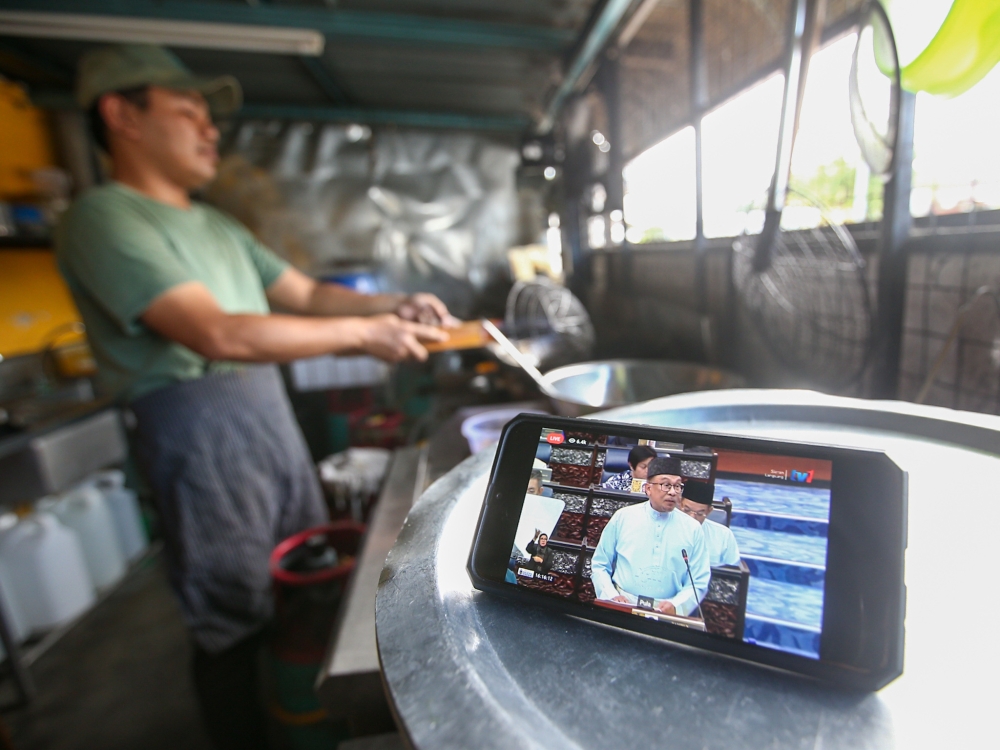FEBRUARY 26 — Prime Minister Datuk Seri Anwar Ibrahim’s previous experience as finance minister during the 1990s may place him a competitive edge to revise the existing Budget 2023 tabled during Ismail Sabri’s administration more inclusively and comprehensively. Yet, there is insufficient emphasis on generating more high-skilled jobs and higher income for middle- and lower-income earners to better cope with the increasing cost of inflation.
While the B40 income group with less than RM2,500 of household income are qualified for Rahmah cash aid of up to RM2,500 (depending on the number of children), the government has to educate lower-income households on how to spend the financial assistance wisely. Ideally, the current unity government is responsibly equipping more job and business opportunities for this income category instead of allowing them solely to rely on government funding for daily survival.
Nonetheless, food baskets and vouchers for staple food items worth RM600 are good incentives under the revised Budget 2023. At the very least, Rahmah cash aid recipients registered in the eKasih system could reduce spending allocation in nutritious food such as eggs, chicken, fruits and vegetables.

While residents earning between RM35,000 and RM100,000 per annum could enjoy a reduction of personal income tax rate by two percentage points, it may not be sufficient for middle-income earners to cope with various financial commitments, particularly housing and car loan instalments. With a four-time increase in the overnight policy rate (OPR) last year, those who obliged with housing and car loan instalments had to fork out at least extra hundred ringgits to pay monthly.
To solve the economic woes among middle- and lower-income earners in the long term, the Anwar-led administration has to put a living wage (instead of minimum wage) as the benchmark to match the actual cost of living among Malaysians.
The New Industrial Master Plan 2030 (NIMP 2030), which will launch in the third quarter of the year (Q323), has to come along with the amendment of the Employment Act of 1955. The current wage system is still associated with a time-based instead of a productivity-linked one. While emphasising research and development (R&D) during the product commercialisation process, adopting a productivity-linked wage system is also crucial to raise the overall salary level in Malaysia, boosting the employees’ morale and being more reflective of the current standard of living.
Instead of allocating RM200 to RM400 for each youth aged between 18 and 20 who are in general digital savvy through e-wallet credit under the Belia Rahmah eTunai initiative, the government could consider arranging for students in this age range to attend upskilling courses (i.e., coding, digital marketing, presentation and communication skills) that will be applicable to their future careers. In turn, they could enhance their employability and earning prospects once they graduate.
Eventually, this would help Malaysia to move away from a high dependence on low-skilled foreign labours. Young Malaysians will be motivated to stay in their homeland for professional opportunities when the government prioritises local talent development to generate more productivity and economic growth in Malaysia.
As a Sabahan, I still wish to see fairer financial allocation and development budgets between Peninsular and East Malaysia. Although the government has increased the development fund of Sabah (i.e., from RM6.3 billion to RM6.5 billion) and Sarawak (from RM5.4 billion to RM5.6 billion) by RM0.2 billion, respectively, compared to the Budget that tabled during Ismail Sabri’s administration before the dissolution of Parliament in October 2022, it does not make any difference. The allocation to Sabah and Sarawak is only a tiny sum from the revised budget allocation of RM386.14 billion.
While the Anwar-led administration emphasises the importance of unity to foster racial harmony regardless of race and religion, the effort is inadequate to foster a closer relationship between Peninsular and East Malaysia.
Although the three main ethnic groups (i.e., Chinese, Malays and Indians) in Malaysia can enjoy cross-communal dining activities during special occasions or festivities, nonetheless when it comes to the regular rhythm of life and as a matter of routine lifestyle, West Malaysian Malays and Muslims usually choose to have their meals in halal-certified restaurants only when eating out for obvious reasons.
In Sabah and Sarawak, the culture is slightly different. Most Malays living in East Malaysia can accept dining in non-halal-certified restaurants, provided halal food is available in the same place. They also do not mind Chinese, Indians, Kadazan-Dusun (representing the non-Muslim Bumiputera Sabah) and Ibans (representing the non-Muslim Bumiputera Sarawak), etc. drinking alcohol and eating pork over the meal session within the same location/site.
In addition to the cultural festival and cleaning school programme stated in the revised Budget 2023, the Anwar-led administration could consider incorporating the case study of how Sabah and Sarawak embrace cultural diversity in the education curriculum and public advocacy programme. In due course, Malaysians would realise the beauty of Sabah and Sarawak and embrace cultural diversity with open minds and hearts in daily interactions.
Given that Anwar only ruled the country for three months, it remains uncertain whether the revised Budget 2023 by the unity government could be fully realised and implemented. Six state elections in Kedah, Kelantan, Terengganu, Selangor, Negeri Sembilan and Penang that will happen in the second half of 2023 will determine the fate of the unity government in the next few months.
* Amanda Yeo is Senior Fellow at Pacific Research Centre. Over the past five years, she gained extensive working experience in the Sabah state government and civic society.
** This is the personal opinion of the writer or publication and does not necessarily represent the views of Malay Mail.





















